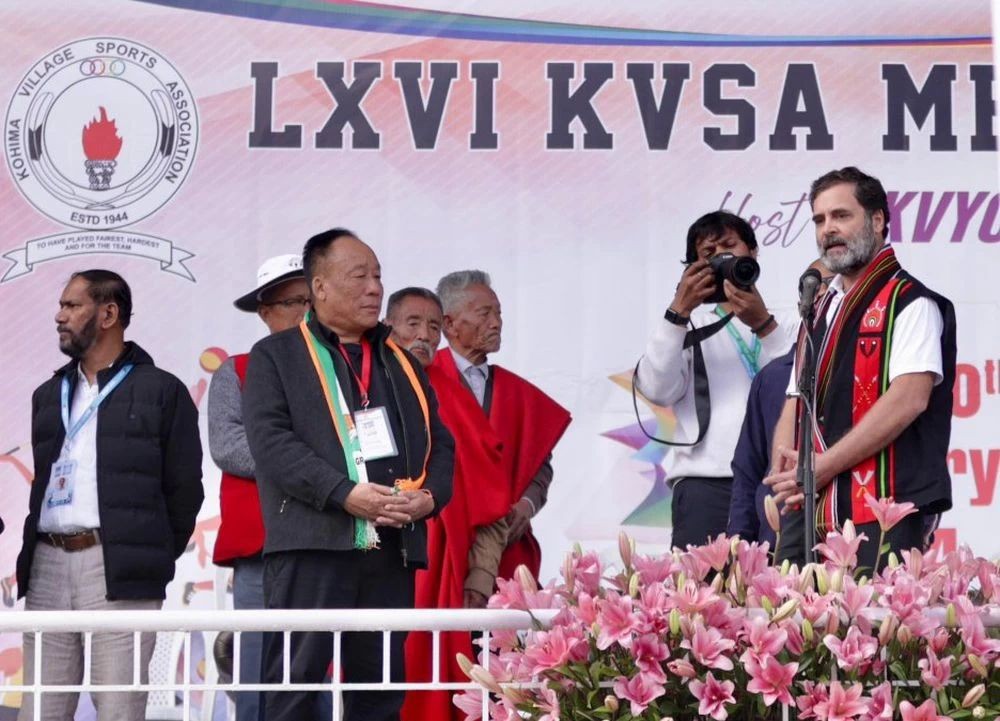Kohima: Congress leader Rahul Gandhi during his visit at the vibrant Indira Gandhi Sports Stadium during the week-long 66th KVSA Meet 2024 organized by the Kohima Village Sports Association,in Kohima,Tuesday, Jan. 16, 2024. (Photo: IANS/AICC)

Kohima, January 16 (MExN): The Global Naga Forum (GNF), in a memorandum submitted to Member of Parliament Rahul Gandhi, on January 15, has urged the Congress leader to support resumption and completion of the peace negotiations. This included the repealing of the contentious Armed Forces (Special Powers) Act (AFSPA).
The GNF also called upon Gandhi to oppose reported proposal to suspend the Free Movement Regime (FMR) agreement with Myanmar and any form of fencing the borders.
The congress leader reached the State on January 15 evening for the Nagaland-leg of his 66-day long Bharat Jodo Nyay Yatra which started from Manipur’s Thoubal district on January 15.
The yare covers around 257 kms in five districts of Nagaland in two days on Tuesday and Wednesday.
Giving a background to its memorandum, the GNF welcome Gandhi to Naga homeland and expressed its belief that he has the goodwill of an overwhelming majority of the Naga people spread across four states in the North-East, as well in the Naga Self-Administered Zone in Myanmar and around the world.
“Our goodwill comes from a common public interest you have with the Nagas: interest in India as a secular, democratic republic both in vision and in practice ,” the Forum said, like Gandhi’s great-grandfather Jawaharlal Nehru and Mahatma Gandhi as well their colleagues envisioned modern India to be.
“Neither majoritarian Hindu Bharat, nor Islamic Indian state, nor Christian nationalist India, etc. will do for us,” it stated.
Hence, the GNF asserted that reducing India to any of these regressive and exclusionary regimes would be a gross betrayal of the progressive India that the people of the country deserve, and the rest of the world expects of India.
Stating that Gandhi’s personal and political ancestry has merged with India’s public history as well as the future, the GNF highlighted to him that the postcolonial India has also been tied up with the fate of the Naga people.
In the interest of “truth and a better future, not in bitterness,” it further reminded to the Congress leader that in 1953 Prime Ministers Jawaharlal Nehru and U Nu drew, “without the consent of our people, an imaginary boundary between their newly independent countries.”
This resulted in creation of “artificial separation of the Nagas and our lands across the international border,” it contended.
When the two national governments decided to divide them, the Nagas “stood up for our right to be a free people and demanded political self-determination and autonomy,” it added.
Since then, Indo-Naga relations went downhill including military invasion in the 1950s; armed resistance by Nagas; iterations of ceasefires and peace missions; bloodshed; imposition of extra-judicial military law (AFSPA, 1958) etc, including the recent massacre of 14 innocent civilians in Oting and Mon in December 2021, the GNF pointed out.
There are also broken agreements such as the 9-Point Agreement with the Naga National Council in 1947; and currently, the indefinitely stalled negotiations on the basis of the Framework Agreement made between the Indian Government and the NSCN/GPRN in 2015, it added.
Amid these, the GNF alleged that Indian government, in collusion with the Chief Minister of Manipur, is considering reneging on the FMR.
This would not only criminalise Nagas visiting one another across the border, but render establishing social and cultural ties extremely difficult, as well as make next to impossible the nurturing of ties and communities for mutual assistance in times of need, it stated.
These would all be a violation of international law and of the indigenous rights of the Nagas, it added, terming it “most unworthy of India’s high standing in the world” and the Naga people “would be altogether justified in losing faith in the Indian government.”
However, the GNF stated that this is not the time for confrontation and recrimination and told Gandhi that as he undertakes the yatra for justice, it was a good time for “reconciliation and peacemaking on the basis of mutual respect and redressing historical wrongs.”
Accordingly, the GNF made submission on Naga political issue as well the FMR.
The GNF memorandum, appended by its Convenor, Chuba Ozukum, and Co-Convenor, Prof Rosemary Dzuvichu, also expressed solidarity with Gandhi for India as a secular, democratic republic, emphasising respect for the rule of law and human rights for all. It also extends best wishes to him for the remaining portion of the yatra.






